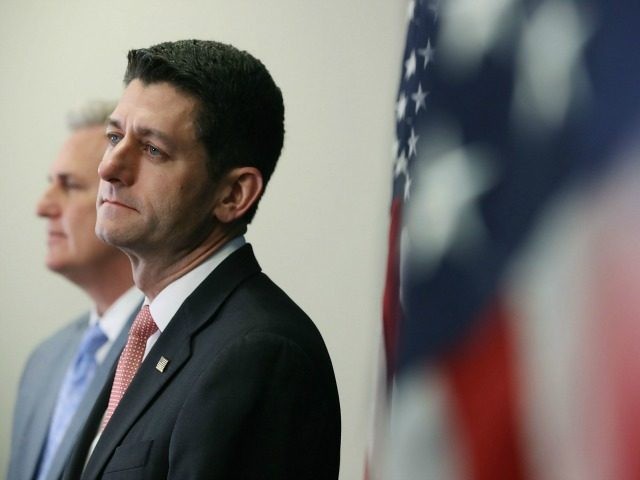Is Congress for real?
You know our representatives have gone off the deep end when they begin considering imposing a tax on the First Amendment to raise more government revenue. But unfortunately, that’s the reality we’re now living in.
Recently, the Daily News and Washington Times reported that party leadership is considering replacing the failed border adjustment tax with revenue raisers from former Rep. Dave Camp’s (D-MI) 2014 tax reform plan. Allegedly, one of the top contenders for replacement is his old advertising tax provision, which would scrap advertising’s full deductibility as a business expense and make it only half deductible, with the other half being amortized over a ten-year period.
Speaker Paul Ryan (R-WI) and Ways and Means Committee Chairman Kevin Brady (R-TX) are too smart to let this tax go into their soon to be released tax reform proposal. If it arises, they must use their knowledge and instincts to kill the provision, because passing such a tax would undoubtedly be political and economic suicide.
Against Our Founding Values
Perhaps the chief spark of the American Revolution was Great Britain’s imposition of an advertising tax – the Stamp Act – on the colonists, which was perceived to be a huge cost burden and an unnecessary limit to residents’ accessibility of important news. The tax was so unpopular that American citizens began unionizing and engaging in mob violence against stamp collectors. Parliament was forced to repeal the provision after just one year, but the colonists never forgave and never forgot. They ended up declaring their independence and engaging in armed rebellion against their mother country just years later.
Unconstitutional
After the colonists won that war and formed their own country, they established the First Amendment, which served as a safeguard against any future regulations of free speech.
By holding back Americans’ money for over a decade, the Camp ad tax proposal would be violating that amendment by essentially making free speech a dollar and cents game. Only those who could afford to do without the money would be able to continue.
It’s clearly unconstitutional, and as constitutional scholar Bruce Fein at Huffington Post and litigation attorney Christopher Cooke at The Hill have detailed, there’s plenty of Supreme Court precedent to prove it. Under the plan, advertising would be treated worse than every other business expense that receives full expensing, making it a clear violation of the First Amendment that would lead to the bankrupting of local newspapers and radio stations. This would keep communities in the dark about what’s going on around them, all while adding more monopoly strength to the already-powerful cable news giants. Essentially, it would do exactly what our founding fathers tried to prevent.
Economic Growth Killer
Going against our founding principles and governing documents is bad enough, but the worst part about this tax is that it won’t even be successful at what its brainchild intended for it to do – fill Washington’s coffers.
There are few things that naturally stimulate the economy more than advertising spending. Reports have shown that annually, ad tax spending generates approximately 16 percent of the United States’ economic activity, as well as 14 percent of total U.S. employment. Thus, imposing such a tax will reduce federal revenue by hampering the many parts of the economy that are dependent on advertising.
An ad tax was already tried on the state level, and not surprisingly, it failed miserably. After campaigning on not raising taxes, Republican Governor Bob Martinez (R-FL) approved an ad tax, which destroyed $2.5 billion in personal income and washed away 50,000 jobs. The tax actually cost the state money – the tax’s administrative costs ended up exceeding the tax revenue. The public was rightfully outraged at the tax’s futility, prompting the New York Times to report that Martinez “suffered political embarrassment in his first year in office by having to shift from ardent support of the tax to advocating its repeal.”
Conclusion
Clearly, including the Camp advertising tax in the so-called 2017 tax “reform” bill would be economic and political suicide, especially for the party that is supposed to be championing limited government and constitutional policymaking. A large portion of the House of Representatives understands this, which is why 124 members signed onto a bipartisan “Dear Colleague” letter to congressional leaders, stating: “The potential for strengthening our economy through tax reform would be jeopardized by any proposal that imposes an advertising tax on our nation’s manufacturing, retail and service industries.” The ball now lies in the “Big Six” tax reformers’ hands. Will they do what’s best for the economy and the American people, or what’s most pleasing to corporate donors and cable news talking heads?
Steve Lonegan is the former Mayor of Bogota, NJ and a frequent guest on Fox News, CNN, and MSNBC. Steve is the former New Jersey Chairman of Sen. Ted Cruz’s presidential campaign, a former senior staffer for Americans for Prosperity and the American Principles Project, and a Republican candidate in several high-profile national political races.

COMMENTS
Please let us know if you're having issues with commenting.